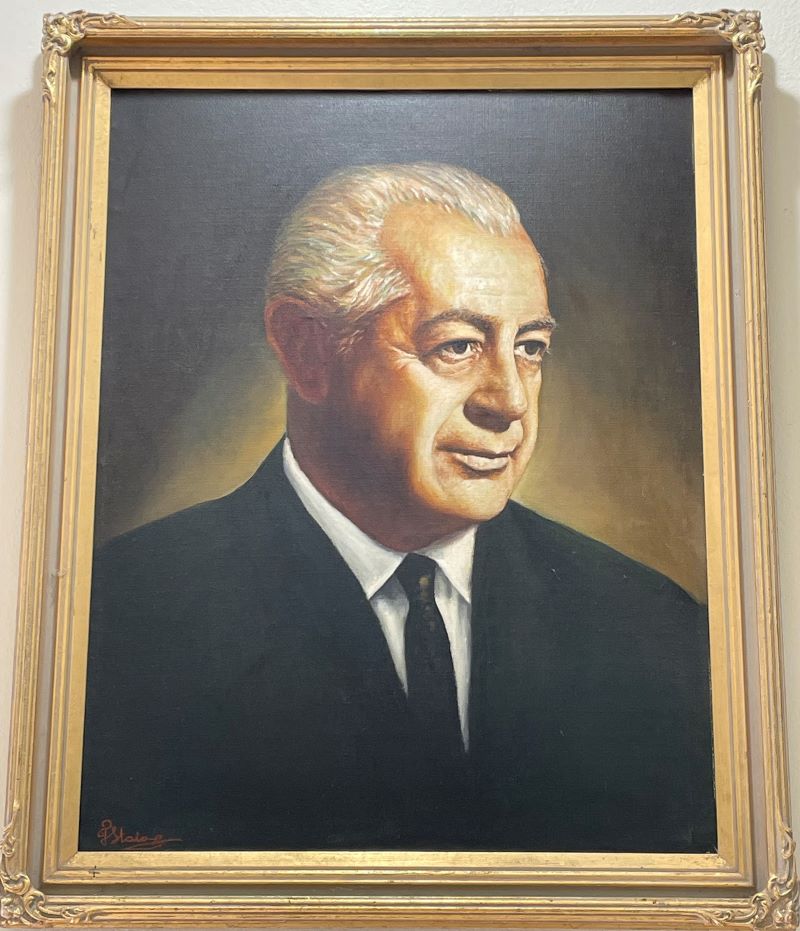<< Back to Lion homepage
Harold Holt: Always One Step Further

‘Harold Holt inhabited two worlds: the worlds of politics and of the sea...’ So begins Ross Walker’s (OW1974) absorbing biography of a man whose significant political legacy has long been overshadowed by the controversial and conspiracy-laden circumstances of his drowning at Cheviot Beach on the Mornington Peninsula. Paul Munn turns the pages.
Launched in a special event at our St Kilda Road campus in early September, Ross’s Harold Holt: Always One Step Further details Holt’s life as both a person and a politician, and offers us a fascinating insight into Wesley’s second OW prime minister, who followed our first - Robert Menzies (OW1912), into the top job upon Menzies’ retirement in January 1966.
He chooses to tell his story in three sections: Holt’s life from childhood, leading up to his prime ministership, his first year as prime minister, and his second and tragic, final year.
The eyes of Wesley readers will naturally be drawn to Chapter 3: Harold Holt goes to Wesley. Holt attended Wesley from 1920 to 1926. Of his time here as a boarder, Ross notes it gave him the stability that was missing from an unsettled childhood, where ‘flux was the only constant.' For him, Wesley became home, and he flourished. In his final year, Headmaster L.A. Adamson made him Acting School Captain and he was named Alexander Wawn Scholar, awarded to the boy who had best attained outstanding achievement in academics, sport and general character.
Ross presents Holt as a man of contradictions – mild-mannered yet passionate, socially extroverted yet drawn to the solitude of the underwater world, life-affirming yet seemingly self-destructive.
The contradictions carried through into politics – he dismantled the White Australia Policy in 1966 and championed the 1967 referendum on citizenship for First Nations Australians, yet controversially escalated Australia’s involvement in the disaster that was the Vietnam War.
His close personal friendship with US President Lyndon B Johnson, which developed after Johnson spent time in Melbourne as a young Congressman Lieutenant Commander during the war, is of great interest here: How much of his staunch decision to go ‘all the way with LBJ’ in Vietnam was influenced by it?
Written over a period of about six years from 2015, Ross’s book has literally been a labour of love: ‘Holt was the first Australian prime minister I remember,’ he says. ‘When I saw him on TV, I was beguiled by his charming personality… There’s also the matter of Holt’s fascination with the sea, which has always been my favourite element.’
The sea was very much Holt’s happy place. For all his gregariousness, he loved the solitude it offered, and would go spearfishing, snorkelling or scuba-diving whenever he could. For him, to be alone under the water was to be free. ‘There is the sheer exhilaration of contact with the sea – of being one with the ocean,’ he once said. As Ross observes, ‘This was his other world, and he had fallen under its spell.’
Ross Walker (OW1974) launches his biography on Harold Holt at our St Kilda Road Campus in September

(L-R) Author Ross Walker (OW1974), Geoffrey Blainey AC, Hon Peter Nixon AO, Joanne Christie and Wesley Principal, Nick Evans

Harold Holt and Sir Robert Menzies, our OW prime ministers

While he already knew quite a lot about his subject going into the project, the research process shifted Ross’s perceptions about Holt.
‘My father once said Holt was “just a nice man” and I agreed, but I discovered that he was not just a nice man – he was very capable. I found that he made an outstanding contribution to Australian life in the decades before he became Prime Minister. He was an outstanding Minister for Labour, where he exploited his interpersonal negotiating skills. He was an accommodator, a seeker of middle of the road solutions.’
He also says he hadn’t been aware of ‘how difficult his last six or seven months in office had been, and the extent to which he appeared to lose confidence. I was repelled by the way some of his colleagues were working to defeat him.’
There was another side to Holt’s personality that surprised him: ‘I hadn’t realised just how reckless he was. I uncovered a clear pattern of him putting himself in harm’s way. There was definitely something self-destructive about him. And he was often nervous and perhaps sometimes doubted his abilities.’
So what can we learn from Harold Holt and his story? Given the increasingly toxic nature of political discourse around the world, Ross’s response is timely and instructive:
‘Holt recognised that if you pushed people away because you disagreed with their politics, you could lose the company of many estimable people. He was friendly with people who held very different political views. In 2022, there is often a tendency to dismiss people who hold the ‘wrong’ opinions – ‘cancel culture.’ Evident in this country but very, very marked in the United States, where political opponents are often seen as enemies. Holt exhibited a high degree of courtesy and respect in his public life – these qualities are often missing today in politics and in many other workplaces.’
In writing this book, Ross aimed to strike a balance between biography and narrative non-fiction – history told as a story. In his prologue, he quotes from Lyndon Johnson’s biographer Robert A. Caro, whose approach as a biographer was thus: ‘You’ve got to have the facts and you’ve got to get them right, but you can’t forget that you’re telling a story.’
In Harold Holt: Always One Step Further, Ross doesn’t forget, and he tells us a good one.